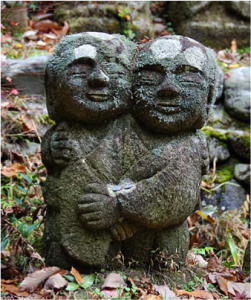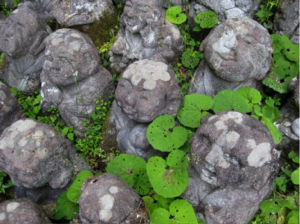Our Many Faces Transcribed on the Rakan disciples at Otagi Nenbutsu-ji
Today I can breathe through my runny nose! My chest rattles when I cough but the headache is gone! Chills, fever, soreness gone! For days I’ve been watching my body yield and engage with this illness – probably a virus that doesn’t belong – yielding to interesting periods of rest and wakefulness. The desires for food, activity and distraction are silent. Engaging with bouts of heat expelling the by products of the struggle with this unwelcome guest. Yielding again to rest and restore that precious life force: Prana.
Over the past week I’ve been feeling Prana, the juice of feeling alive, ebb and flow in my body and mind. I recognize the weight of identity my bodymind carries: my will to perform a constellation of roles, to consume so many forms of stimulation, to support this identity I wish to be and others to see. This illness undermined my will and ability to perform; it diminished my hunger for my every day desires. There just wasn’t much energy left to fuel ego’s ever-demanding need to be fortified and sustained.
I’ve been living pajama days of present moment. Beyond caring what “I” looked like. Beyond planning activities. Beyond recalling past performances. I trust many of you friends reading this know these pajama days and I know that some of you live with far greater health challenges. I never got beyond hearing anxious fears whispering: What if “I” don’t get better (I want my life back)?! What else must “I” surrender?
Our whole life experience is really a mysterious land we build roads of certainty over. Illness arises like the weather, uncontrollable, often unknowable, eroding our so carefully constructed roads. We’re in new territory now. We’re left with our ability to cope and to orienteer: to find our way by reading nature’s signs, becoming our more animal selves, listening and sensing direction.
Buddhist Nun and teacher, Pema Chodron tells me that in stilling activity, in the pause of the present moment our basic goodness can arise. She describes this goodness we share as our natural intelligence, warmth and openness. When our awareness isn’t caught in the struggle of not wanting things to be as they are, the potential for something precious emerges. I think that something precious is simply the recognition of our embodied consciousness, our capacity for self-awareness and the ability to choose.
How amazing is it that we can choose to respond to life’s changing weather any way we want? We can even release our “selves” from judging our choices. We can return to the healing of the present moment again and again. Each time we come back we bring ourselves to the inner spring of our natural intelligence, warmth and openness. Ani Pema urges us to trust our basic goodness. She also encourages us to cultivate the soil of our mysterious land of experience through practice. In the fertile soil of an open mind seeds of insight can grow. We can become more intimate with ourselves and with each other. We can marvel at our capacity to feel in sickness and in health.
In this place of meeting and knowing our shared humanity, so much is possible. We can cry, laugh and touch!
 Tim just came in, early morning latte in hand expressing: “Coffee is so Friiiicking Good!”
Tim just came in, early morning latte in hand expressing: “Coffee is so Friiiicking Good!”
I look up grinning, enjoying this grin as it reaches inside and out – a good stretch – and say: “I’m so glad you’re enjoying your coffee so much!”
Tim: “You are so beautiful!”
Catherine: “Yup! We both have bed-head and it’s working for us!”

